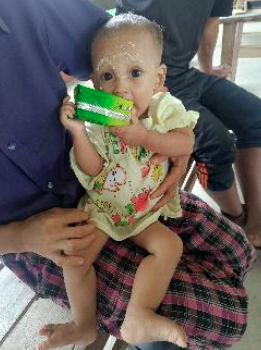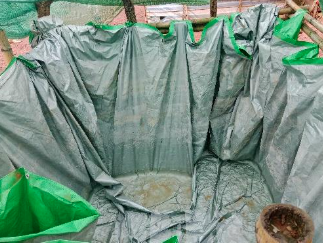Myanmar's Volunteers: The True Actors on the Ground
By MKE Staff
10 March 2025
As both a resident and a normal humanitarian project monitoring staff in an issue-ridden country such as Myanmar, I have not seen enough good articles talking about the local actors (volunteers) on the ground. Wars occur for many different reasons: Evasion? Defense? Ethnic minority issues? Or from natural disaster issues? I am too little to talk about these big topics, but I can tell you what I witnessed in visiting Internally Displaced People (IDPs), refugees, civilians’ sites, and villages in Myanmar. I have many questions but only one answer to all of them.
In the following article, I will share my personal recollections as a humanitarian project monitoring staff that have shaped my resolutions towards the impacts of war on the people of Myanmar.
While located in the Kayin state (east of Yangon, bordering Thailand), I had the chance to speak to an IDP. He shared,
“I am a 62 year old man and I have used my entire life savings to own a house that was recently burnt down by the air strike. I have no home to go back to. I have no energy to restart everything to get my house back. I am now old enough to wait for my death,”
with a pair of emotional tearful eyes and shaking hands. I can even still remember the story of what all he has been through. We collect the stories but we have no capability to reverse the situation and his feelings.
“I left everything at home where I had to leave for my safety. I barely feed my children. A bowl of pure white rice became a blessing for my family because our farm got destroyed by the armed conflict and no one stayed to remain at the village. I have been in the resettlement site for 3 years with no job opportunities and could not expect the real day that we all could go back to our homes. I am thankful for all the foods, supports and nutrition to my children,”
said a happy mother from the East Bago region who received nutritional support that turned her malnourished child into a normal healthy kid. While I listened to the story, I wondered who is continuously watching these kids' well-being, other than their hard-working mothers?
“I want to request the project to support the recreation kits, toys for the kids to play,”
was said by a volunteer teacher in Chin State where the monitoring team also witnessed children playing an empty bottle as a football. In every remote part of the states/regions, there are challenges in children’s basic education - ranging from basic needs to children’s toys. Additionally, in Kayah State the transportation of education items to camp bases, village-based schools, and centers is prohibited for no reason. In Kayah, regular air strikes on schools have caused deaths and have trained the children to enjoy childhood in the bomb shelters. In the situations of no accessibility to education, no safety, no security, and no basic need fulfilments; who has helped the children to keep studying and cope with the parents’ stress?
“My child had an operation in Yangon Hospital and it cost 5 million kyats, which was borrowed from an informal lender. The doctor gave appointments for follow-up checkups but [we] were unable to return to the hospital. My child is acutely malnourished and was born without an anus. The food supports I received were truly beneficial for my family, as my husband has no permanent job and one disability, and there are two elderly people in my family,”
a mother of the child who is beneficiary in a nutritional project recalled. I realized that there will be many similar stories and cases throughout Myanmar. Who kept reporting the cases and issues to the funding organizations?
“There is no clean water in the village and we used the water purification tablets and purifier machine to get the drinking water. We can wash-off the dirty clothes and wear them again tomorrow. The nearest town is 1-2 hours drive by car. There is a military base on the way and sometimes, we were asked to give money or arrested. Recently, the whole bus and passengers were burnt down for no reason. It was so difficult to live in the villages and camps with limited hygiene facilities. The only water source is 2 hours drive from my camp and which is used to bath the buffalo and we used that water for drinking,”
the community school teacher told me. I was impressed and questioned myself who can actually deliver the most useful water purification tablets and purifiers?
There are still many stories that remain untold. The ones shared here unfold into many more questions I still have yet to ask. But for now, I seek to answer my questions, from the experiences of visiting those remote areas and listening to the stories of the local people, with THE LOCAL ACTOR. Informed by my personal observations and knowledge in Myanmar (acknowledging its potential to not quite reach global standards), I define THE LOCAL ACTOR as “An organization or a person who takes risks to identify and fulfill the needs of the community, and reports on the human rights to international bodies, and ensures quality implementation to the maximum of their ability and understanding of global standards and ethics – regardless of personal direct wage gains.”
THE LOCAL ACTOR occurs on different levels. According to my monitoring experience as a Third-Party Field Monitor for the humanitarian sectors, I assert that local actors occur as:
An individual: a community-based volunteer, a Civil Disobedience Movement (CDM) staff
An organization: a faith-based association, an ethnic armed department, a community-based organization, a civil society organization or a group of friends
When critiquing the Local Actor, it is necessary to recognize their salary and security limitations, amongst how hard they tried and how much they are committed to help the community.
Salary: Due to the security risks extending in Myanmar, most of the International or Local Non-government organizations have left Myanmar or disappeared. The existing ones have also been unable to complete the implementation due to inaccessible travel to those locations. Thus, the community-based volunteers become the answer to these struggles. Community Volunteers conduct baseline data, mid-term and even end-line evaluation data collection, implement the activities and submit it to the supervisor of the organization.
In that amount of work load, community volunteers generally get paid at minimum 20,000 MMK (9.53 USD) to at maximum 150,000/200,000 MMK (71.50/95.33 USD) per month. The community-based volunteer of a recent nutrition project gets paid a 20,000 MMK (9.53) stipend and a 10,000 MMK (4.77 USD) phone and internet allowance per month. There is no food allowance nor transportation allowances provided. At the exchange rate around 2000 kyats to one dollar, these community-based volunteers in the field are only compensated under 10 USD each month. Whereas a program staff sitting in an office earns approximately 400 USD per month.
Should they not deserve more? Upon meeting community-based volunteers in the field, I always asked them, “Do you enjoy working as a volunteer?”, and “What additional support do you want to receive in order to implement the activities better than right now?”. Most of the volunteers’ answers really impressed me in that they enjoyed the work because they know that they are important in helping people and addressing community needs. Some volunteers love being with the children at the school. Some love helping women to save and reduce child deaths. Some even pitch in their own money to send the elderly to the mobile clinic. What else could have been done at their capacity?
Security: Many limitations in political structure and governance have been a huge barrier that stops the assistance to reach the targeted populations. In the middle regions of Myanmar (Magway, Sagaing, Mandalay and Naypyitaw) it is so risky to do humanitarian work at the high profile level. Organizations hide their profiles and implement projects on a very low profile. Operating with religious associations under church and monastery names become the safest options to deliver the supplies.
There are at least 10 Check points to pass when travelling from town to town. So, I asked the organization, “Who is responsible for your safety?”, and the answers were always “ourselves”. That answer always reminds me whatever I have done to my country is not enough.
THE LOCAL ACTORS are risking their lives just to help people everyday while I am sitting and writing this article. I am going to stop writing here, as my Third-party field monitoring team is now calling me to travel to a very remote area to listen to the stories of people. I collected the stories, even though I could not improve the situation, I will be at least writing it to the people who can.




